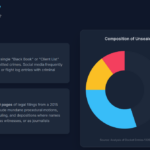
From digital marketing and Etsy shops to tutoring, TikTok content, and freelance coding—Gen Z isn’t just working jobs, they’re building brands. The traditional 9-to-5 isn’t dead, but it’s no longer the default. Instead, a new generation is redefining what it means to earn a living, chasing flexibility, freedom, and fulfillment through sidBusiness & Financee hustles.
The trend has become so prominent that side hustles are no longer seen as temporary gigs or weekend income boosters—they’re a core part of Gen Z’s economic identity.
A Generation Born in Crisis
Gen Z, typically defined as those born between 1997 and 2012, came of age during economic instability, pandemics, and a rapidly shifting tech landscape. It’s no surprise they’re taking a different approach to work.
According to a 2024 report by Deloitte, nearly 46% of Gen Zs already have a side hustle, with many saying it’s not just for extra income—it’s an essential part of their career strategy.
“Gen Z is highly entrepreneurial,” says Ashley Stahl, a career expert and Forbes contributor. “They’re not waiting for corporate promotions—they’re creating their own streams of income, often around skills and passions they already have.”
Technology Has Opened the Door

What’s fueling this boom? Technology. Platforms like Fiverr, Shopify, Substack, and TikTok have made it easier than ever to monetize talents and build micro-businesses from home.
A student can teach English to kids in Korea using Cambly, design logos on Canva, or earn through affiliate marketing—all before finishing their degree.
This digital-native generation has grown up with these tools at their fingertips. “It’s not just about making money,” says career coach Emily Durham. “It’s about building something on your own terms.”
From Hustle to Identity
Side hustles aren’t just side gigs anymore—they’re part of Gen Z’s personal brand.
A LinkedIn Workforce Confidence survey found that Gen Z users are more likely to include side projects and freelance work on their profiles than older generations. From fashion drops on Depop to content creation for niche audiences, these ventures are public-facing, curated, and proudly showcased.
“Your side hustle tells the world what you care about,” says Durham. “Whether it’s a vintage resale shop or a nonprofit you started online, Gen Z knows their work is part of their identity.”
Financial Necessity Still Plays a Role
While passion is a huge driver, let’s not pretend side hustles are always glamorous. Many Gen Zers turn to freelance work out of necessity. The cost of living in Canada has soared, with inflation making it harder to survive on one income.
A 2023 Bankrate survey in the U.S. found that 53% of Gen Z adults say they need a side hustle to pay regular bills—not to save or invest.
“The hustle isn’t always by choice,” says economist Linda Nazareth. “Wages have stagnated while expenses have skyrocketed, especially for rent, tuition, and groceries. Side hustles are filling that gap.”
Side Hustles Are Changing What “Career” Means
Forget climbing the corporate ladder. For Gen Z, a career isn’t a single job or employer—it’s a portfolio of income streams. This mindset shift is transforming how young people think about stability and success.
Instead of looking for job security in one place, Gen Z is learning to diversify their income, much like older generations diversified their investment portfolios.
“Resilience now comes from being adaptable,” says Dr. Jean Twenge, author of Generations. “Gen Z has watched companies lay off workers, industries vanish, and pensions dry up. They don’t trust systems—they trust skills.”
The Gig Economy and the Freedom Trade-Off
Apps like Uber, DoorDash, and TaskRabbit offer quick income and schedule flexibility, but critics warn about burnout, lack of benefits, and long-term insecurity.
Still, many Gen Zers say they’ll take the freedom over stability. A report from McKinsey revealed that 70% of independent workers globally choose gig work over traditional jobs—even if it means giving up health insurance or paid vacation.
“The old model was ‘work hard, retire later,’” says entrepreneur and YouTuber Erika Kullberg. “Gen Z is flipping that. They want freedom now—not when they’re 65.”
Side Hustles Are Going Mainstream
What was once seen as a hustle “on the side” is becoming a primary income source for some. According to StatCan, over 1 in 3 Canadian workers under 30 now engage in freelance, contract, or part-time independent work.
And businesses are taking notice. Some employers are encouraging side hustles, recognizing that they build entrepreneurial skills and reduce burnout. Others are adapting by offering flexible hours and “intrapreneurship” programs that allow employees to innovate within the company.
Education Is Shifting to Meet the Trend
Even universities are catching up. Schools like the University of Toronto, Ryerson’s DMZ, and UBC now offer courses and incubators dedicated to entrepreneurship, freelancing, and digital business building.
“Side hustles aren’t distractions—they’re skill builders,” says Prof. Lauren Kelly, who teaches digital entrepreneurship at UBC. “Students who freelance while studying gain practical experience and confidence. It’s reshaping what education should deliver.”
Final Thoughts: Not a Phase—A Philosophy
For Gen Z, side hustles aren’t just a way to make ends meet. They represent a deeper shift in values: freedom over structure, autonomy over authority, creativity over conformity.
From YouTubers and brand consultants to tutors, drop shippers, and TikTokers, Gen Z is building an economy where skills matter more than titles—and where no one job defines you.
As Durham puts it:
“Gen Z isn’t anti-work. They’re anti-boring, anti-underpaid, and anti-being told there’s only one way to succeed.”
And they’re just getting started.















